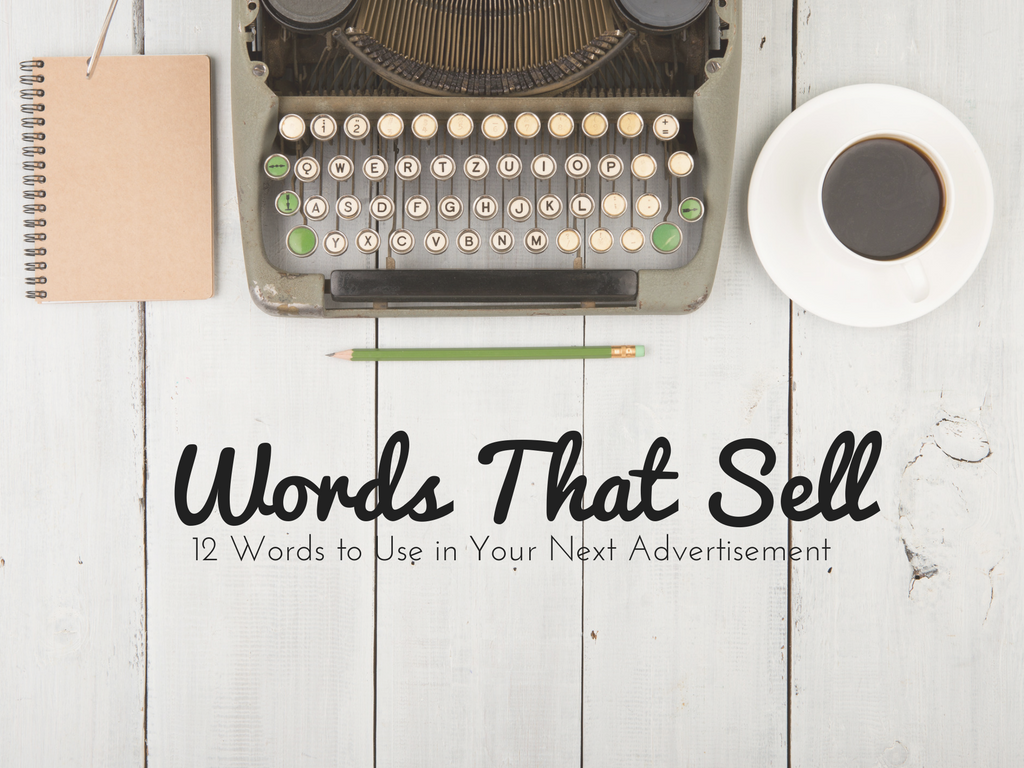
Words That Sell: 12 Words to Use in Your Next Advertisement
When it comes to advertising, the image is almost always the star of the show. Page through any magazine, and you’ll notice many bright, bold images with sparse text. That’s because text is typically not what initially grabs a reader’s attention. It is, however, what seals the deal.
Words are weapons
When creating an advertisement, it’s important to remember that you have only a split second to catch a shopper’s attention. You can usually do this with (as mentioned above) a bright, bold image. But once you have the shopper’s attention, you need something more than a pretty picture to complete the sale. Now you need to use your words to tell this shopper why he or she absolutely must buy your product. This is where a killer headline and copy come in.
To seal the deal and give your advertisement that last bit of oomph, add one of these 12 words into your headline or copy.
1. You

The shopper is the star of the show in advertising. Make sure your advertisements focus on what you can do for your customers.
What can you do for shoppers? How can you make their lives easier? Focus on them and the problems they might be having. Shoppers are selfish (we mean that in the nicest way). They’re flipping through magazines and searching the Internet looking for products to solve a problem they have, They really don’t care what you think, feel or do. They want to know what you can do for them. Make your potential customer the focus of the advertisement and watch how it draws them in.
Not only does using the word “you” in your copy or headline make your customer the focus of the advertisement, but it also makes things personal — you’re no longer referring to them as an anonymous shopper.
2. Value
Every shopper wants a great value. It’s your job to convince your customers that’s exactly what they’re getting.
For the most part, shoppers don’t care about all the fancy features your product might have; they just want to feel like they’re getting a great deal. When writing copy, skip the part where you tell customers how amazing your product supposedly is, and instead tell them how and why your product or service is so valuable.
3. Because
Sometimes telling customers they’re getting a great value just isn’t enough. Sometimes, you need to explain why they’re getting a great value. That’s where “because” comes in.
Give customers a reason to buy your product or service. Buy these shoes because you need comfortable running shoes. Purchase this snack because you want something healthy and delicious. Buy this because, etc. You get the point. Tell your customers exactly why your product needs to be in their lives.
4. Free
This one is fairly self-explanatory. Everyone loves free stuff, right?
Even if your product itself isn’t free, you can include something else as added value for no extra cost. For example, think of those late-night infomercials that offer a free apron when you buy a pan, or a free tumbler when you buy a blender. When customers see this, they think they’re getting more for their money. Again, this goes back to making shoppers think they’re getting a good value.
5. Risk-free
If free is good, risk-free is better.
Shoppers don’t like taking risks when making purchases. They want to know they’re not wasting their money buying something that’s not going to work. Using a word like “risk-free” or “guaranteed” makes customers feel safe purchasing your product.
6. New
Everybody wants to have the cool, new product. If your product is new, it’s cutting-edge, innovative and hot. It’s the “it” item, and everyone has to have it.
7. Best
Everyone wants the best. Ensure shoppers the best is exactly what they’ll get when they purchase your product.
8. Limited
If you want to get shoppers to act quickly, convince them your product is limited and flying off the shelves.
Oftentimes, shoppers will see an advertisement for a product they like and think about making a purchase, but then wait for another time. If consumers believe this product is a limited quantity and selling out at record speed, they’ll be much more likely to make the purchase at that moment.
9. Premium
Using a word like premium insinuates that your product or brand is superior to all other competitors. What you’re selling must therefore be a high-quality, luxury item. You can also use a word like “elite” or “prime,” both of which symbolize the same exclusive, upscale nature of your product.
10. Instant
We are a generation driven by instant gratification. We want results, and we want them right now.

Shoppers are always seeking instant gratification. If your product can give customers instant results, make that know in your ads.
If your product can give customers instant results, make that known. Can your face cream visibly reduce wrinkles in 24 hours? Does your skincare line give users clear skin in less than two days? If the answer is yes, include this information in your headline or copy. Remember, customers are shopping because they have a problem they need to solve. The faster you can help them solve that problem, the better.
Just remember, don’t include any false or misleading claims in your ads. If your face cream takes two months to start showing results, don’t promise shoppers their wrinkles will disappear overnight. This kind of thing can get you in serious trouble.
11. More
Even if you give customers a great sale, a premium product and instant results, they’ll always want more. Again, I bring up those late-night infomercials. In each and every one, after promising incredible results and including additional products, there’s always that “but wait, there’s more…”
Create that same kind of feeling in your advertisements (minus the infomercial vibe, of course). Include a sample of another product, a limited-time case or bag, or something that will make customers feel like they’re getting the deal of the year.
12. Save
Whether it’s saving time or saving money, everyone wants to save. Make it clear what customers will save by purchasing your product.
The old English idiom says a picture is worth a thousand words, but we think one powerful and well-placed word can be worth a thousand sales. Pair together a great image and a few of these words that sell for an advertisement that’s guaranteed to succeed.
